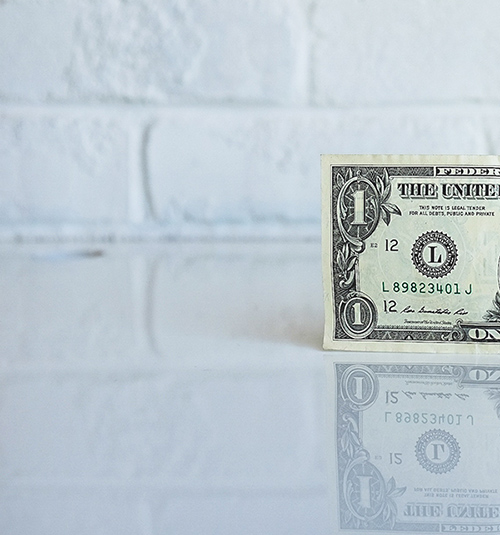by Becca Ehrlich
On January 1, 2018, my year of no shopping began.
Let me qualify that: My year of no shopping allows me to shop for necessities, like food and toothpaste. I’m still in graduate school, so books are necessities. And replacing things that wear out or break–necessities.
But things that aren’t necessities? Sorry, cute shoes, see you next year.
Why am I doing this? In a word: minimalism.
Last December, I watched Minimalism: A Documentary. It changed everything I thought about how so many of us look at material possessions, success and happiness. I knew that God was calling me to live a more minimalist life.
What does minimalism mean? Here’s the definition I’m working with: Focusing on what matters most and removing anything else.
Most minimalists begin by paring down their personal belongings. But it’s not just about getting rid of stuff; it’s about focusing on what matters.
Small on stuff, big on privilege
 Taking up minimalism has another effect: It sheds light on economic privilege. I am able to shed possessions only because I have had the resources to accumulate them in the first place.
Taking up minimalism has another effect: It sheds light on economic privilege. I am able to shed possessions only because I have had the resources to accumulate them in the first place.
But I have found a link between my faith and my minimalism. Jesus tells us: “I came that they may have life, and have it abundantly” (John 10:10). And that abundant life means focusing time and energy and resources on what matters most. It means removing anything keeping us from living that full, abundant life that Jesus came to give us.
To get closer to that abundant life Jesus wants for us all, I know I needed to make some minimalist changes. My husband and I are working to shed at least half our accumulated stuff. I have renewed my commitment to writing and study, and I have taken more time for friends and family. And I have set aside time to focus on my relationship with God.
Money matters and Jesus
Jesus talks a lot about money in the Bible. How we use our money matters to Jesus. The message we get from our commercial culture is to buy, buy, buy; spend, spend, spend. But we Christians are called to be counter-cultural—because our life’s meaning is not wrapped up in material things. It is through Jesus Christ that our lives have meaning. Minimalism helps us cut through the clutter and the busy-ness to refocus on our Triune God—Father, Son, and Holy Spirit–and the aspects of life that truly matter.
I knew that minimizing my possessions and prioritizing my time and energy wouldn’t be enough. I had to make a point of fasting from shopping.
Fasting has a long history in our faith tradition. In the Bible, people fasted for many reasons: in mourning, in seeking connection with God, and in preparation for a spiritual event.
Lent has long been a season of the church year when people fast in repentance and to focus on God. The Greek and Latin roots of the word repent literally mean a “change of mind” or to “turn around,” and for centuries people have chosen to fast in order to turn and return to God.
When we think of fasting, we usually think of food—but fasting can mean letting go of anything to focus more on God and the things that matter most. Lent is a good time to fast from certain types of spending, to discover how spending money can be done for the glory of God.
Fasting from some aspect of shopping or spending for the season of Lent offers an opportunity to be more deliberate about how we use the resources God gives us.
Discussion questions:
1. What do you think about minimalism? What aspects of minimalism could you see yourself trying? What would an abundant life, as Jesus said, look like for you?
2. How is God calling you to think about your shopping, buying, or spending? What are some ways you could “change your mind” or “turn around” the way you think about and use money this Lent?
3. Would you consider a shopping fast for a short amount of time? Why or why not? How do you think a shopping fast could help prioritize your life and focus on what matters most?
Closing prayer:
Loving God, we know that all that we are and all that we have comes from you. We know that your son Jesus came so that we could live a full life. Help us to focus on what truly matters– serving you and serving others with what you give us– so that we can have the full life you want us to have. In Jesus’ name, Amen.
 Becca Ehrlich is a Lutheran pastor serving as associate Director of admissions at United Lutheran Seminary in Gettysburg and Philadelphia, Pa. She blogs about minimalism from a Christian perspective at www.christianminimalism.com.
Becca Ehrlich is a Lutheran pastor serving as associate Director of admissions at United Lutheran Seminary in Gettysburg and Philadelphia, Pa. She blogs about minimalism from a Christian perspective at www.christianminimalism.com.


The idea of fasting from shopping as a choice vs not shopping because of limited or no funds may be difficult to understand unless you have actually experienced having nothing to spend for any extras. I like especially your statement that it matters to Jesus how we use our money! Thanks for a very timely and well-written article.
Points well taken. I have so much, but all of that detracts from what is relly necessary and needed; the love of God. When I feel that I don’t need anything else.
Very well stated.I have tried to conserve resources in my lifestyle. I’ve driven a hybrid car for 10 years now. We’ve bought the most efficient light bulbs, a dual flush toilet, and installed solar panels. Another effort to consume less.
Becca, I’m just wondering if you have written or could suggest a Lenten series that addresses this minimalist thinking for a congregation to use during the Midweek (and even Sundays) in Lent. I am the Worship & Music Chair for my congregation and we are currently in a vacancy, so I have been “in charge of” coming up with the topics and liturgies for the Lenten season. If we don’t find a pastor soon, I’ll one again be designing something! I am retired, so totally understand the minimalist thinking and am trying to pare down my household!
Thanks for any advice you could give me.
Deanna